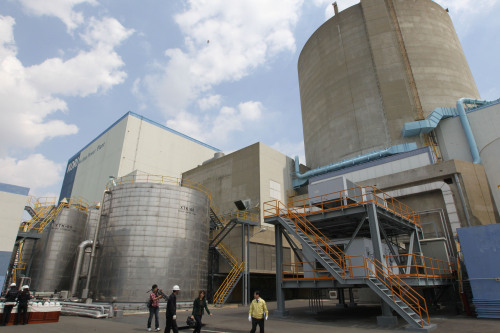The government came under pressure as a soaring number of Koreans are casting doubt on atomic energy after plant operators were found to have attempted to conceal power loss at a nuclear reactor in Busan.
Despite no damage or radiation leakage, the accident infuriated the public and anti-nuclear protesters. They raised questions over the public workers’ integrity and whether they are prepared for a longer outage that could result in a disaster like that seen in Japan.
The 12-minute blackout occurred after a worker mistakenly tripped an external circuit breaker, bringing a diesel powered generator to a halt, Hong said. But a backup electricity system stayed online and the Gori-1 unit was already dormant and cool for the sixth day of regular maintenance.
Knowledge Economy Minister Hong Suk-woo on Wednesday apologized for the Feb. 9 incident, which was disclosed only last Friday by a city council member after the official overheared a conversation at the next table at a restaurant.
“It was clearly an error that they did not comply with rules on reporting any problem immediately, however trivial,” Hong said, promising a sweeping probe that will meet the government’s priorities of safety and transparency of atomic plant operation.
Despite no damage or radiation leakage, the accident infuriated the public and anti-nuclear protesters. They raised questions over the public workers’ integrity and whether they are prepared for a longer outage that could result in a disaster like that seen in Japan.
The 12-minute blackout occurred after a worker mistakenly tripped an external circuit breaker, bringing a diesel powered generator to a halt, Hong said. But a backup electricity system stayed online and the Gori-1 unit was already dormant and cool for the sixth day of regular maintenance.
Knowledge Economy Minister Hong Suk-woo on Wednesday apologized for the Feb. 9 incident, which was disclosed only last Friday by a city council member after the official overheared a conversation at the next table at a restaurant.
“It was clearly an error that they did not comply with rules on reporting any problem immediately, however trivial,” Hong said, promising a sweeping probe that will meet the government’s priorities of safety and transparency of atomic plant operation.

The incident comes as Japan marks the first anniversary of a nuclear meltdown at its Fukushima complex, following an earthquake and tsunami.
Radiation emitting from the crippled reactors in the island country has since withered confidence in nuclear power, often touted as a feasible source of clean energy at home and abroad.
More Koreans liken the latest accident to that in their neighbor country due in part to the involvement of human error, which put Tokyo Electric Power under fire. At the end of August, Japanese Prime Minister Naoto Kan stepped down, taking responsibility for the government’s mishandling of the nuclear crisis.
In the aftermath of the Japanese debacle, countries including Germany, Switzerland and Italy embraced plans to phase out or scale down their nuclear facilities.
Korea, however, is sticking to its plans to boost nuclear power to 59 percent of the country’s electricity supplies by 2030, from the current 31 percent.
“There’s no alternative to nuclear power at this point,” Hong said in Abu Dhabi last week. “That’s why we need to fend off growing negative perceptions on a national level.”
Asia’s fourth-largest economy also seeks to become a leader in nuclear power plant construction following a landmark export deal to the United Arab Emirates in 2009. It is now targeting projects in Turkey, Vietnam and other countries.
Stakes are high with the Nuclear Security Summit in Seoul less than two weeks away. Nearly 50 heads of state and top officials from multinational bodies are expected to discuss issues such as the peaceful use of atomic materials and nuclear energy safety on March 26-27.
To rally public support and ensure safety and security at the stations, the government has been carrying out sweeping safety checks and cautionary measures in line with a legislative revision.
It crafted 50 short- and long-term action plans based on worst-case scenarios that cover an extreme natural disaster, power failure and severe accident, according to Chang Soon-heung, president of the Korean Nuclear Society and a professor at Korea Advanced Institute of Science and Technology in Daejeon.
“Some slowdown is expected in the near term, but in the mid- or long-term, nuclear energy will expand given an increase in energy demand and efforts for energy security and global warming,” Chang said at a forum in December.
State-run Korea Hydro and Nuclear Power Co. runs 21 reactors in the country’s south. The first one in Gori began operation in 1972. The plants have not had any major accident since they opened.
By Shin Hyon-hee (heeshin@heraldcorp.com)





![[Herald Interview] 'Amid aging population, Korea to invite more young professionals from overseas'](http://res.heraldm.com/phpwas/restmb_idxmake.php?idx=644&simg=/content/image/2024/04/24/20240424050844_0.jpg&u=20240424200058)











![[KH Explains] Korean shipbuilding stocks rally: Real growth or bubble?](http://res.heraldm.com/phpwas/restmb_idxmake.php?idx=652&simg=/content/image/2024/04/25/20240425050656_0.jpg&u=)

